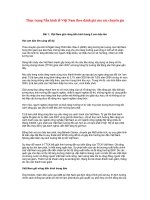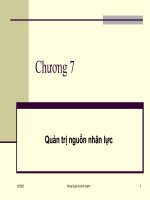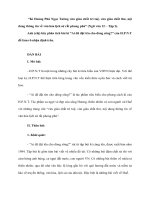Ex-U1- E1CB- By N.T.Nhan
Bạn đang xem bản rút gọn của tài liệu. Xem và tải ngay bản đầy đủ của tài liệu tại đây (54.9 KB, 1 trang )
Date: ................................
Period: .............................
Exercise for Unit 1
A. Phonetic
I. Choose the word that has the underline part pronounced differently from the others:
1. A. machine B. change C. teacher D. choose
2. A. condition B. option C. suggestion D. relation
3. A. believe B. readily C. friend D. pleasure
4. A. good B. gossip C. game D. geometry
5. A. trust B. mutual C. number D. uncertain
6. A. caring B. behave C. name D. take
7. A. humour B. mutual C. picture D. pursue
8. A. clothes B. honest C. home D. sorrow
9. A. easy B. mean C. pleasant D. team-mate
10. A. cheap B. choose C. chilly D. character
11. A. general B. give C. gossip D. guitar
12. A. mutual B. picture C. quality D. question
13. A. change B. generous C. great D. village
14. A. friends B. mates C. secrets D. mathematics
15. A. helped B. visited C. introduced D. influenced
B. Vocabulary and structrure
II. Choose the best answer:
1. Some people think that you have to (see/ know/ meet/ comprehend) someone really well to
become good friends.
2. When a (rumour/ news/ whisper/ information) was spread that Tom was killed, Antony returned
to Rome.
3. He said he would reward you for your (loyal/ intimate (th©n mËt)/ secret/ constancy) and
devotion to him.
4. He must be so blinded by (selfish/ trust/ essence/ selfishness) that he should risk his own life to
keep the secret
5. I met Jane in our first year at high school. It was the start of a lifelong (friendship/ friend/
sympathy/ loyalty)
6. All the time we were at school, Lan and I were really (mutual/ trust/ close/ lasting) friends.
7. Unless mutual sympathy (exists/ lays/ feels/ has) between friends, friendship is impossible.
8. Don't be (concerned/ suspicious/ influenced/ uncertain) by whisper, rumours or gossips. Trust
your friends.
9. If you mutually decide you have some things in (general/ common/ character/ mutual), then you
have found yourself a nice new friend.
10. Being true friends means you need to support your friend, but be prepared to (whisper/ talk/
blame/ advise) them agaist treading through dangerous waters.
11. It's possible (take/ to take/ taking/ to be taken) a train across canada.
12. Now that we've fished painting the house, there is nothing left (to do/ fr doing/ to be done/ for
being done)
13. Before we leave, let's have Shalley (draw/ to draw/ drawing/ drawn) a map for us so we won't
get lost.
14. I can hear a cat (scratches/ to scratch/ scratching/ was scratching)
15. I think your nother should let you (make up/ to make up/ making up/ made up) your own mind.
16. It was so relaxing to be (in between/ among/ around) old friends.
17. She's made friends (to/ of/ by/ with a little girl who lives next door.
18. The children seem to be totally capable (on/ of/ in/ for) working by themselves19. Your friend
should be based (on- basic/ in- fragile/ on- mutual/ in- blind) trust.
19. Friendship is a two- sided (affair/ event/ aspect/ feature), it lives by give-and-take.
III. Match a verb in A with a noun phrase in B to make an approriate phrase:
A B
1. to catch 6. to interview
2. to take 7. to do
3. to write 8. to tell
4. to open 9. to mix
5. to win 10. to pass
a. the salad f. the exam
b. the taxi g. a joke
c. the prize h. the briefcase
d. the shopping i. an applicant
e. the train j. a letter
IV. Complete the sentences with the form of the verb in brackets:
1. I didn't have enough time _______ (finish) my work yesterday.
2. As she drove past his house, she noticed him _____ (run) away from home.
3. I was relieved (vui) ______ (find out) that I had passed the exam.
4. She made her son _______ (wash) the windows before he could go outside ______ (play) with
his friends.
5. She lets her children ______ (stay) up very late.
6. We had nothing ______ (do) except look at the cinema posters.
7. We both heard him _____ (say) that he was leaving.
8. It made him angry _____ (wait) for people who were late.
9. I couldn't understand what the passage said, so I had my friend _____ (translate) it for me.
10. It's important _____ (start) the meeting on time.
11. There are too many people here ____ (talk) to all of them.
12. I took ages _____ (download) thepictures from the Internet
13. Whenever I have free time, I like ____ (watch) the basketball team ____ (practice).
14. She sent me an e-mail ___ (inform) me that the meeting had been canceled.
15. It was a thrill ____ (see) my brother ____ (win) the chess tournament last year.
C. Reading comprehension
I. Choose the best answer to fit each gap.
I suggest that if you want to be a food friend , you should become friends (1) ..... someone you
actually like. This automatically eliminates all teachers, politicians and (2)...... who get rid of
school holidays. Once you have found someone you have things in (3) ..... with, you should
expand on this and get to know your friend better. Perhaps inviting her to sit (4) ..... to you in
maths or even talking to her now and then could help.
If you (5) ..... decide you have some things in common, good - you have found (6) ..... a nice new
friend. If you don't have anything in common, don't (7) ...... and keep searching - there plenty of
other (8) ..... in the sea! Yes, a friend will require quite a large proportion of your time, because
naturally (9) ...... sides need to be enthusiastic for a (10) ...... to blossom.(në hoa) Happy friend
huning!
1. A. with B. to C. for D. if
2. A. everyone B. anyone C. people D. someone
3. A. connection B. common C. general D. relation
4. A. near B. beside C. by D. next
5. A. mutually B. mutual C. have D. actual
6. A. you B. your C. yourself D. yourselves
7. A. worried B. anxiuos C. worry D. anxiety
8. A. fish B. shrimp C. crab D. squid
9. a. your B. both C. all D. each
10. A. friend B. friendly C. friendlier D. friendship









